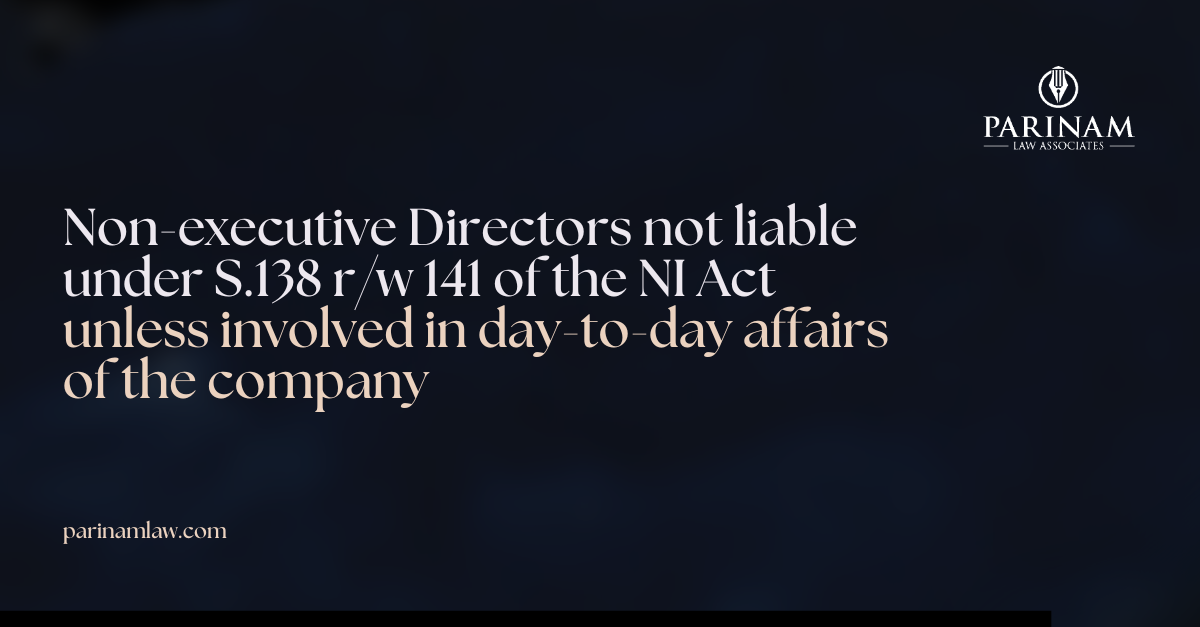INTRODUCTION:
In a recent judgment passed on July 1st, 2022 by Justice P.D. Naik in the case of Satvinder Jeet Singh Sodhi & Anr. v. State of Maharashtra & Anr., (hereinafter referred to as the “Case”), the Hon’ble Bombay High Court held that a non-executive director, not being a promoter or key managerial person of the company, can only be held liable with respect to those acts of omission or commission by the company which had occurred with their knowledge, consent, connivance or where they did not act diligently.
The said judgment quashed a complaint under S.138 of the Negotiable Instruments Act, 1881 (hereinafter referred to as the “NI Act”) against the authorised signatories and directors of a company. This Case forms a crucial part in the jurisprudence of the NI Act, along with the interpretation of the provisions under S.149 of the Companies Act, 2013 (hereinafter the “Companies Act”).
FACTUAL BACKGROUND OF THE CASE:
Elektromag Devices Private Ltd. (hereinafter the “Complainant”) was engaged in the business of various types of material handling equipment. The directors of Tepcro Systems (hereinafter “Accused No.1”) placed an order with the Complainant for the purchase of Electromagnetic Oil Cooled Overband Magnetic Separators on behalf of the Accused No.1. Accordingly, the Complainant delivered the material to the consignee, and the cheque of amount INR 29,31,849.30/- (Rupees Twenty-Nine Lakh, Thirty-One Thousand, Eight Hundred and Forty-Nine Point Three Zero Only) was signed by Accused 11 and 12 viz. the authorised signatories of the Accused No.1. However, the cheque when presented by the Complainant to their bank, was dishonoured with reason “Funds insufficient”. The Complainant on 17 August, 2013 served a notice on accused nos. 1, 2, 3, 6, 9, 11, and 12. Accordingly, the Complainant proceeded to file a complaint on 30 September, 2013 for the offence punishable under S.138 of the NI Act.
LEGAL ANALYSIS:
Application of S.149 of the Companies Act
S.149(6) of the Companies Act defines an independent director as a director other than a managing director or whole-time director or a nominee director.
S.149(12) of the Companies Act is a safe harbour provision for non-executive independent directors. It provides that an independent director or a non-executive director can only be held liable “only in respect of such acts of omission or commission by a company which had occurred with his knowledge, attributable through Board processes, and with his consent or connivance or where he had not acted diligently”
Further, in the case of Chitalapati Srinivasa Raju v. Securities and Exchange Board of India, (AIR 2018 SC 2411) it was held by the Hon’ble Supreme Court:
“Non-executive directors are, therefore, persons who are not involved in the day-to-day affairs of the running of the company and are not in charge and are not responsible for the conduct of the business of the company.”
Invocation of S.141 of the NI Act
As per S. 141 of the NI Act, a person shall not be liable to punishment if he is able to prove that the offence was committed without his knowledge, or that he had exercised all due diligence to prevent the commission of such offence. Further, where any offence under has been committed by a company and it is proved that the offence has been committed with the consent or connivance of, or is attributable to, any neglect on the part of, any director, manager, secretary or other officer of the company, such director, manager, secretary or other officer shall also be deemed to be guilty of that offence and shall be liable to be proceeded against and punished accordingly.
As per the judgment of the Hon’ble Supreme Court, in the case of Pooja Ravinder Devidassani v. State of Maharashtra (AIR 2015 SC 675) it was held that in order to fasten vicarious liability on a person under S.141 of the NI Act, a person should have been at the helm of affairs of the company and actively looking after the day-to-day affairs of the company at the material time. Further, the Hon’ble Supreme Court also observed that:
“Simply because a person is director of company does not make him liable under the NI Act.”
CONCLUSION
In the present Case, the Hon’ble Court held that the applicants were independent non-executive directors who did not have an active role in the day-to-day affairs of the company and therefore could not be prosecuted under S.138 r/w S.141 of the NI Act. Therefore, the Hon’ble Court, using its discretionary powers under S.438 of the Cr.P.C., quashed the proceedings against the applicants but allowed the trial against the other accused i.e., the Company to continue.
Therefore, by virtue of this judgment the safe harbour provision provided under S.149(12) of the Companies Act, is expanded thereby protecting the non-executive directors who are not involved in the day-today activities against unlawful acts or omissions of the company.
DISCLAIMER
This alert has been written for general information of our clients and should not be treated as a substitute for legal advice. We recommend that you seek proper legal advice prior to taking any action pursuant to this alert. We disclaim all liability for any errors or omissions. For further clarifications, you may write to Mallika Noorani (mallika.noorani@parinamlaw.com), Sachit Kumar (sachit.kumar@parinamlaw.com), Akkshay Thawani (akkshay.thawani@parinamlaw.com), and Rhea Tewary (rhea.tewary@parinamlaw.com).




